From cloud to crowd: a report on a server transfer
From cloud to crowd[1]: A report on a server transfer
This text is a report on a server migration that took place within the institutional framework of The Institute for Technology in the Public Interest (TITiPI), a trans-practice gathering of activists, artists, engineers and theorists. The report is an infrastructural ethnography[2] and aims to rethink, through a technical process, what hosting a server means for a community, institution, cultural organisation dealing with technological discomforts and complex digital infrastructures.
Starting from a broad definition a server is a computer, a combination of software and hardware or an operating system and a physical machine that provides computing services, such as web hosting and cloud storage, via a network (Internet). A server migration is the process of moving data and transferring software from one server to another with the use of specified tools. Performing such process accommodates a practical and technical solution to fix the problem of an outdated server that is slow or has limited storage.
This report problematizes the materiality of a server, its location, scale, community, architecture and substantial elements, and how and what is migrated when we decide to change servers. The urgency of this issue derives from the question of how does an organisation's digital infrastructure affect its values, structure and infrastructural imaginations? TITiPI treats web hosting with attention, rather than as an outsourced tech service, by including it in the thinking and reflection of its organisational structure. In times of server providers’ scaling up ( ‘cloud hosting’ ) and digitizing governmental bureaucracies what does it mean to host your own digital space for supporting your communities and work? Is it necessary to have a sovereign and independent infrastructure? What (non-)dependencies are chosen or taken for granted by institutions when using hosting services?
As a researcher at TITiPI I have been caring for the task to investigate this server migration, that includes web hosting and email, and execute it together with TITiPI’s member Femke Snelting. We meet weekly to keep track and make decisions. We share a markdown file hosted in the online code repository of the cultural association Constant that includes a diary of the server migration and reflections. Every now and then we meet online with our colleague Helen Pritchard, to discuss and share the process. This report includes extracts from the server diary and stories from the process.
Migration or …?
In the cold Autumn of 2023 in the newly installed office of TITiPI located in the Koekelberg district of Brussels, I open the browser Chromium in my computer, in order to quickly translate − with the installed Google Translate plugin − the web pages of the different cooperatives, associations, companies that provide hosting services. While doing that I cannot ignore a persistent thought regarding the word ‘migration’ under this context. What does it mean to flatten the experience of migration into a technical term to describe the movement from one server to the other? In what contexts such choices of language are made and who decides about the terminology?
My computer runs the open source operating system Ubuntu. The term ‘Ubuntu’ is also a word extracted from its original context. It is coming from the African Ubuntu philosophy. According to the creators of the software:
ubuntu |oǒ’boǒntoō| Ubuntu is an ancient African word meaning ‘humanity to others’. It is often described as reminding us that ‘I am what I am because of who we all are’. We bring the spirit of Ubuntu to the world of computers and software. The Ubuntu distribution represents the best of what the world’s software community has shared with the world. [3]
Paraphrasing Panashe Chigumadzi words: in contrast to the western conception of the human as individual, the African conception of the person is a social being who is always becoming, defined by and being responsible for the personhood of the others. "(T)he African philosophy best understood through the proverb found in Bantu languages across the continent, 'umuntu ngumuntu ngabanye bantu' (a person is a person through other people." [4]
(D)espite the flourishing of Ubuntu in post-apartheid discourse, lending its name to software, businesses, books and philanthropic organisations, South Africa is a country in which we have, as Dladla argues, Ubuntu without Abantu. Just as Black people have been dispossessed of their land, Ubuntu has been dispossessed of its deeply radical demands for ethical historical and social relations among people. (...) (P)ost apartheid Ubuntu mistranslation 'I am because we are', individualized and interpersonalised Ubuntu, Christianised Ubuntu, mistranslated in order to justify crimes and violence. In Ubuntu violence can be punished even after generations, the misinterpretation of the term allowed individual forgiveness. [5]
I skip these thoughts and I continue browsing the list of servers. While doing so I encounter an autonomous server with the DeepL translated title: ":: a shelter for digital exiles ::" accommodated by the image of a woman, a child and a man leaving their home and an introduction: "Exiled from the global village of social networks, we claim an internet that is a simple means of communication: immaterial, anonymous, imaginary, public when it makes sense and secret when we feel the need." ‘Social media exiles’ and ‘Twitter migration’ are terms used often after Twitter became X and users have moved to the Fediverse or other alternatives.
Using metaphors like that for a technical process de-contextualizes a word from its origins and may reveal the privileged place these extractions come from, often dominated by white male computer engineers who get inspiration from struggles happening elsewhere. Could this terminology be shifted towards other words? Could words like transfer, share, move, copy, re-install, shift replace the word ‘migration’? From this point on in the report I decide to pick and use the term ‘transfer’.
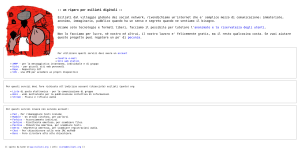
TITiPI’s case of server transfer
On the 27th of September, sitting at the long desks side to side, Femke and I have an online call with Helen, while looking at the depths of our Virtual Private Server (VPS), provided by Linode, that runs Ubuntu on our laptop screens. Linode is an American hosting provider focusing on Linux-based virtual machines originally. The server is physically located in the UK. TITiPI currently uses the Linode server that Helen set up for hosting her own projects. They have been paying for Linode’s monthly fees so far.
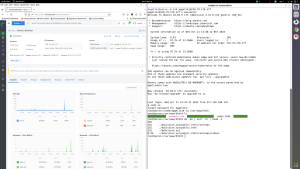
At the time it seemed a good choice, because Linode is based in UK, is Linux friendly and an alternative to Amazon Web Services (AWS), even though the company was already identifying as ‘cloud hosting’. But in February 2023 it has been acquired by the American company Akamai that aims to scale up for "computing power, optimizing performance and agility." Akamai is actively changing its server policies into an increasingly intense cloud logic. This pushed forward the desire to move to a new place.
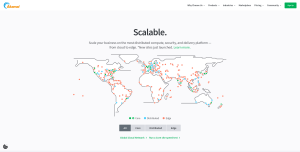
At the moment in Linode we run pico, a flat CMS for the website https://titipi.org. There is a Mediawiki (you are reading a Mediawiki page right now) for notes and collective writing. On the wiki, we also publish our statutes, guidelines and other instituting documents. The wiki has a custom extension, called wiki-to-pdf. Each of these services will need a different way to be transferred. One approach is to build the new server space from scratch, copy the data with rsync and transfer only the Mediawiki, which includes installing a new version and copy the database and the media files.
While preparing to transfer the tools we are defining what are the practical needs and desirable priorities. What fantasies of servers we have; a local physical server hosted in a small computer Raspberry Pi in the office; a software defined server located in a virtual location of a physical machine somewhere in the Alps? We ended up on these server requirements:
- SSH access and VPS
- affordable price (around €20/month)
- Free Software operating system, preferably Debian
- community work is included − desire to slow down, resist to scaling and growth or ‘decloudification’ (small network of partners, less virtualization approach, location of servers nearby etc)
- 25-40GB storage space, 1-2 cores, 2-4GB RAM
- environmental angle
- service support in a language that we all understand (English mostly)
This server transfer happens with an intersectional and feminist approach and the desire to keep questioning. While moving away from Linode we include both the technical and the conceptual thinking in the process. There are a few things that we are looking at:
- Where to be transferred to or what services to transfer to?
- How to be transferred and what to transfer?
- What terminology, language we use?
- What (other) narratives of server hosting can we construct?
TITiPI seeks to exist with an infrastructure that supports inter-dependent practices and solidarity across struggles. It develops Counter Cloud Actions as a way to scale down, de-cloudify, articulate, contest and re-imagine the implications of computational infrastructures (‘the cloud’). We are looking for servers that aspire some of these values:
TITiPI develop tools from feminisms, queer theory, Free, Libre and Open Source software, intersectionality, anti-coloniality, disability studies, historical materialism and artistic practice to generate currently inexistent vocabularies, imaginaries and methodologies. TITiPI functions as an infrastructure to establish new ways in which socio-technical practices and technologies might support the public interest. [6]
A narrative of relational infrastructure and infra-mutuality
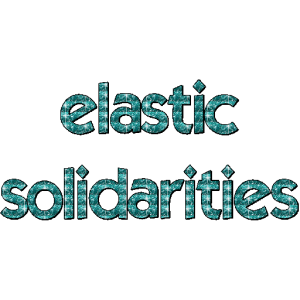
In June 2023 TITiPI received an email from Gandi to renew the domain titipi.org in 6 days, not realising that at the same time we would need to start paying for our titipi.org email hosting. We had missed reading to the end of another email sent in the middle of June, entitled: 'Pricing update'. Thus we decide to transfer the email besides the web hosting.
We consider to work with Kate Rich to move our mailboxes to the Irational server, soon to be installed on a Raspberry Pi, hosted at Servus. We plan to do this transition slowly and until then renew the emails for 1-2 months through Gandi. Irational server resists virtualization, and as an art community project it makes it an interesting choice.
But why to go through all this effort and not just use one cloud server with mailboxes, file storage and web server together? TITiPI’s response to the question of building institutional digital infrastructure embodies an archipelagic and non-sovereign approach to dependencies. Rather than building a centralised server based on ‘cloud’ from which connections with other institutions and collectives can happen, it conceptualizes inter-infrastructural practices; from the creation of a backup script for saving locally etherpad pads from other servers, hosting emails in an art server (https://irational.org), creating an online bookshelf on lumbung.space, using the XMPP chat from Varia to recording conversations with the sysadmin that maintain the other servers. The institution re-imagines technological dependencies in dialogue with cultural institutions and art collectives.
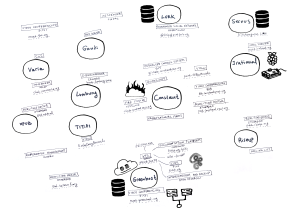
How to give life to the common space of TITiPI’s hosting infrastructures? What about building up social dependencies between the ones that host and the ones who are hosted as opposed to a solely technical independence? Infrastructural imaginations are often built by the Big Tech industry and governmental institutions. Instead, TITiPI practices a fluid inter-institutional approach supported by a variety of hosts.
Selection of server providers
On the 7th of November through a shared screen at the video conferencing software Jitsi of Greenhost we all three check a list of server providers I collected on a spreadsheet hosted in Constant’s cloud storage (built with the open source Nextcloud software) where TITiPI has an account. I looked at associations, companies, cooperatives, communities coming from commercial context to social struggles, activist, feminist and other. Through a list of networks I found various servers mainly from Latin America and Europe.
The concept of autonomy, sovereignty, independence or self-managing characterizes most of the servers in the list. Some of them, like Autistici promote this concept as a way to support anti-capitalist infrastructure and protect the privacy of the users as opposed to the Big Tech software practices.
The vision is that we - the members of the cooperative - own our own data. This implies and has as a consequence that we will have to own our own infrastructure and have insight and control over the software we use to communicate on the web.[7]
Femke had a hunch: "‘technological sovereignty’ and ‘data-sovereignty’ continue to be orientation devices to organise around. ‘Sovereignty’, together with ‘freedom’, ‘independence’ and ‘autonomy’, form an ideological cluster that implicitly and sometimes explicitly foregrounds separation rather than relation."
Servers can act as independent spaces but are also cultural devices and vibrant places. They can manifest different aspects of a full life and reach out to a multiplicity of entities.
Servus and Greenhost, seem to be two of our best choices as they cover a lot of the priorities and values of TITiPI. As one can read from their descriptions they both strive for owning their own data servers and data nodes (they have their own IP addresses) and be independent from third parties. Their big difference is the scale of the infrastructure and their community and network.
Greenhost fully owns and controls its hardware, infrastructure and uplinks. This ensures independence from third parties and proper access control. On this hardware we run our fully virtualised platform. We stand for an Open Internet, and have always embraced open source software.[8]
We (Servus) do not pass on any data to third parties. You will not receive commercial advertising from us or third parties. We are easily accessible and answer your questions personally. We and our servers are located at Kirchengasse 4 in Linz, Austria.[9]
Even though Greenhost wants to reduce ecological damage, it does that mainly through hardware reductions and does not address scale. They have plans to expand and are part of a network of partners that want to transform Rotterdam into a big hub of data nodes for the upcoming digital transition. But Greenhost is not that big as Linode that goes for "(p)lanetary scale." Servus on the other hand has one room of data servers, is closer to the scale of their community and maintain personal relations with them.
Community server, feminist server, trans*feminist server, radical server, autonomous server, commercial server, art server, free server, ethical server, solidarity-based server, cooperative server, associative server, independent server, alternative server, non-commercial server, …
The spreadsheet starts to grow because of an endless burrow of small and big providers.
Some are outdated.
Some are messy.
Some have broken links.
Some are hard to understand.
Some require a lot of engagement.
Some use a language that imitates the narratives of Big Tech and agile computing.
Some promote seamless "promissory logic" and "high hopes for a brighter future"
Some are big or are scaling up (in matter of space, data centers, partners, users etc).
Some support NGO’s or sport clubs.

We also looked at their financial model. Many radical servers stay small, are volunteer based, like Autistici. and go for horizontal organisational structures. Feminist and activist servers provide space in the internet for the ones who don’t have the means to organise otherwise. The resources and ways of organising for these servers are different from the cooperatives or associations whose structure is inherited from the model they are registered with.
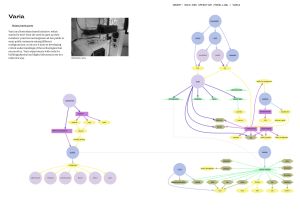
TITiPI acknowledges and is connected to the history of community, art and feminist servers and wants to support this network. The art servers started as a way to make autonomous self-managed servers that support artists values and practices. They are often financed by cultural or private funds.
Irational.org began in the 1990s, I joined in 2010. At that time Irational was more active as an art collective who were operating a shared server. Then in 2016, coinciding with a server upgrade, we disbanded and re-formed specifically as a Linux server collective, which is a better description of what Irational is now. A small group of artists who are interested in running a Linux server together. (...) Part of Irational's interest has always been in running a physical server, not a virtual machine as is nearly ubiquitous now. When I started out as Irational sysadmin, we were using rescued servers from commercial server farms – fully working computers that were being thrown out as part of the perpetual cycle of upgrades. We would install Linux on a discarded machine, and get low-cost hosting at a server farm in London. Then when our previous server was reaching the end of its life, this was in 2016, we also felt a tectonic shift. There was a large-scale move to virtualisation, people weren't running individual physical servers in the same way as before, and the supply of deprecated rack mount servers seemed to have dried up. So for the first time we bought a replacement server brand new, and drove it to Cheltenham in west England where we installed it in a server farm run by gamers – one of the few places we could find that was still prepared to host a single machine.
— quote from interview of Kate Rich by Femke Snelting
The screen seems to become brighter as my eyes get tired. What if we skip the online hosting and create a local physical server at TITiPI’s office next to the desks, in a corner, on a Raspberry Pi? All our data would stay on this machine and we would connect with SSH from home, but then we will also have to maintain it ourselves. There is something there about the romanticism of a physical toolbox as a sovereign object. If we choose to do that we will need to think of a backup plan as our data will stay offline and the server will rely on the building's network bandwidth and fire protection system. A second option is to have our own server in a rack at Servus, where we would have connection to high speed reliable internet but electricity costs would be higher and we would rely to somebody else if we need to turn the server off and on. We think to do that with the email hosting that we would share with Irational, where we have root access inside someone else's physical server hosted in Servus. The third option is VPS which is a cloud technology but we have access to our own virtual machine that we can start and stop from distance.
Our list has been reduced because of our priorities. We need SSH and we would like to have a VPS. Who has resources for providing VPS? Resources of labour, time, finances, technical knowledge. This made self-defined feminist servers fall out of the selection. How to be financially sustainable, while keeping up with your own values? How to keep up with infrastructural maintenance if the scale of the users, community, members and data is big?
The services we offer have no defined price, but as you may easily imagine, keeping the whole system working (i.e. hardware and hosting) is very expensive (at the moment it ranges around 13,000 euro every year).[10]
Servus and Maadix provide a series of free/libre tools that can be installed separately through their interface but they also provide a VPS with SSH access. With Greenhost, Hetzner and Linode there is more flexibility: you can create your own VPS and customize it for your own needs through their interface or the terminal and install whatever tools you want from scratch without a visual interface.
Technical information and knowledge of digital infrastructure circulate between groups that are tech-oriented with a difficulty to cross with other groups, including feminist servers. The sysadmin tasks are mostly taken by cis men but feminist servers are radical about that. They find important to have sysadmins that are not cis men. For example Systerserver and Anarchaserver are learning collectively by themselves how to do this task.
Many of the servers in the list provide only tools, as a radical way to support small groups, collectives, activists that need privacy and shifting away from Google drive when they want to organise politically and socially. It seems that being limited to tool packages instead of having full access to a server can make things comprehensible and compact for these small groups that have limited sysadmin knowledge or can’t hire a technician.
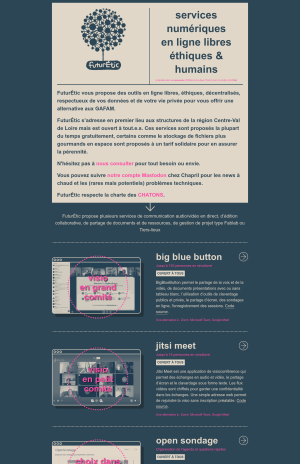

Final decision and server transfers (email and webhosting)
We are about to make our decision! Our list ended up to be very small.
On 7th of November in an online call between Helen in Basel, Femke in Brussels and Aggeliki in Rotterdam we limited our list to four options: Constant, Greenhost, Servus, Zaclys. The selection consists of a diversity of scales and positioning that we found interesting to think of. First, we move on with the decision to transfer our mailboxes to Irational hosted at Servus. The rest of the functionalities will be hosted somewhere else.
From our conversations with Femke: "The choice for irational.org opens the possibility for discussions around dependencies, trust and frictions within shared collective servers. Irational.org is an ally art server who uses and maintains its own server for many years. Hosting such a private service at a friend’s environment doesn’t come only with convenience. The closeness to the material of the server makes the dependency more tangible."

Femke and I are planning different moments for the server transfer to happen in the office of TITiPI. What it is about to take place comes down into three moments; the backup and save of data from the old server, the installation of the necessary software in the new server and the transfer of the old data in the new server.
Specifically we are following these steps:
- Email transfer from Gandi to irational
- Create a Virtual Private Server (VPS) in the new server
- Install Apache2 and configure domains
- Install and migrate MediaWiki
- Back up the wiki on the Linode VPS
- Upgrade MediaWiki in Linode
- Install MediaWiki and plugins in the Greenhost VPS
- Transfer database and media files from Linode to Greenhost
- Install Wiki-to-pdf
- Install Pico
- Install and configure Certbot
We find ourselves between two virtual spaces and one office, among other indirectly connected spaces like the rooms of our distant collaborators and the office locations of the servers.
Trust relationships
By now, 14th of November 2023, the office is warm and cozy. Throughout the time I am writing this report I have been noticing a lot of slow and small efforts to renovate the building and set up the heating, by the artists and organisations who share the space with TITiPI. Another infrastructure that needs care.
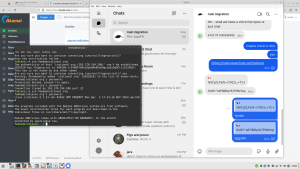
On a shared screen together with Femke we get introduced to the mail server of Irational by Kate. We use an audio splitter to share the laptop for the call. Kate described her experience as an amateur sysadmin that had to spend a lot of time to learn and set up the mail server. After that we start the process that has been documented here.

Irational uses the Alpine email client. Kate takes us its depths. That is where we start to set up our new email accounts before we configure them in Thunderbird. Femke gets excited on the fact that she can send emails to other Irational accounts through the terminal.
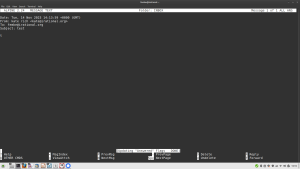
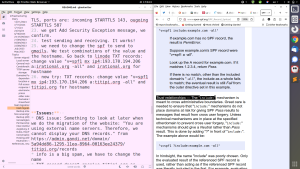
After some more DNS configurations we test if it is possible to exchange emails with ‘outside’ accounts and especially with Gmail that has many security filters for mail servers other than the commercial ones.
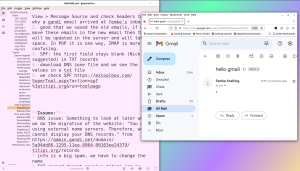
After three hours of tryouts we manage to make it work! Very proudly and with enjoyment for sharing a technical task together we say goodbye to each other and arrange a next meeting for a final check up.
A choice that comes with discomforts
Just one day before the start of TITiPI’s server transfer away from Linode on the 28th of November, Helen found the Swiss server ungleich.ch and it seemed like an interesting choice because of the small scale (in terms of community and servers), their experimental attitude and their choice to reduce energy consumption; they avoid using systems for cooling their servers by spreading the servers at the Swiss mountains in old, abandoned buildings.
Ungleich.ch is one of the good options but it is more expensive than other providers. They offer a cheaper choice by choosing to have only ‘ipv6’. But we had to dig in to understand the difference of ipv4 and ipv6. From wikipedia: "IPv6 is the most recent version of the Internet Protocol, developed to deal with the long-anticipated problem of IPv4 address exhaustion." We found a map that shows which countries have implemented IPv6 and it seems that if we only use this address then many places won’t have access to the website of TITiPI. We choose to have both addresses.
We also notice that this provider is using Stripe for their payment system. In a parallel universe TITiPI gives attention to and critique Stripe because of its connections with the Carbon Removal industry.

Another urgency appears while we are looking at different choices; together with many other organisations, we have been thinking about ways to host and maintain infrastructures in solidarity with communities and networks we are part of. This would mean, for example, hosting digitally a Palestinian video film archive, or research by sex workers. Solidarity is only partially a question of caring for privacy and security because it matters where and how we host our digital infrastructures and whether these spaces do or do not support the flourishing of different lives and struggles. This need make us think again if the server we choose would be suitable for something like that.
Constant and Servus are two accomplice servers that already provide to TITiPI some of their services. Zaclys is a member of Chatons that support open source values and it is located in France. We contacted them to see if they could be an option but we didn't get an answer back.
Part of the desires of an infrastructure that cares we wanted to work with a company that provides ‘green’ infrastructure. Greenhost seems to be a good choice for that and also because it has a positioning as an alternative to AWS, it provides a familiar interface to us, good support and backup option. So far great, but what about its ‘green’ hosting vision? Is it a solarpunk vision, a green cloud utopia? Is their infrastructure resource ‘hungry’? And what are the privacy limits when the material hosted in the servers is political or sensitive?
We choose Greenhost with all the discomforts that this choice entails and with the desire to keep the critique and dialogue alive.
Only by December 2023 we manage to arrange a call with one of Greenhost’s former Managing Directors to get a feeling and more information about their approach and sensitivity. According to him, Greenhost exists in the intersection of activism and technology. It provides consultancy, sustainability solutions in tech projects and structured maintenance; they go for best quality with lowest environmental impact; they maintain the same hardware as much as possible and balance that with higher efficiency; they keep backups at an already existing data center in the university of Amsterdam.
Installing, transferring, saving, copying, …
On the 28th of November sitting on the sunny corner of the couch next to the radiator, and with warm coffee cups waiting for us on a low table, Femke and I cover our legs with a blanket and open our laptops.
I ask Femke to 'jump' in a tmux session for sharing terminal with this command: sudo tmux attach -t webserver. We start by cleaning the old server and make backups of the files.
We take a lunch break. Femke finds out that if we eat three recurrent meals every week in the office we can have a nice variety of food; lentiles soup, orecchiette pasta with brocoli, rizzoto with mushrooms and lots of fruits. Sometime ago we decided to make multiple short breaks throughout the day because of computer fatigue. The next day we set up the new server and install all the necessary software including a new version of the MediaWiki. We arrange a meeting with Martino Morandi, member of Constant, who created the wiki-to-pdf to help us installing this software and transfer the MediaWiki in the new server. On the 1st of December we successfully install the wiki-to-pdf and because of limited time we decided to meet one more time at the end of the month for the rest.
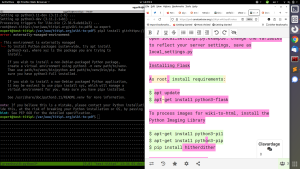
On the 28th we meet with Martino online to complete the transfer, which includes copying the old database of MediaWiki, activate the old plugins and fix any issues on the way. We are all located in different countries (Italy, Greece, Belgium) and so we share a tmux session. We follow the guides but on the way we had to do some research and configure a lot of things to make the MediaWiki work. Martino was hunting a php module. It seemed that php has shifted to free software culture in an attempt to find another business model. It is not surprising it happens in the context of Ubuntu. The issue is recorded here.

The process is documented in our diary and then transferred to a wiki page. By January 2024 the server transfer and the deletion of our Linode account has been completed.
Glossaries
Italicized terms in the report are included in these glossaries:
References
- Panashe Chigumadzi, ‘Can White South Africa Live up to Ubuntu, the African Philosophy Tutu Globalised?’, The Guardian, 31 December 2021, sec. Opinion, https://www.theguardian.com/commentisfree/2021/dec/31/white-south-africa-ubuntu-african-tutu
- ‘Community Servers - Monoskop’, accessed 16 July 2024, https://monoskop.org/Community_servers
- David Carroll, ‘How To Open An Outpost In Social Media Exile | TechPolicy.Press’, Tech Policy Press, 26 November 2022, https://techpolicy.press/how-to-open-an-outpost-in-social-media-exile.
- Femke Snelting, ‘Infrastructure Solidarity’, Ardeth. A Magazine on the Power of the Project, no. 8 (1 November 2021): 45–47
- ‘Master-Slave Terminology Alternatives You Can Use Right Now | TheServerSide’, TheServerSide.com, accessed 16 July 2024, https://www.theserverside.com/opinion/Master-slave-terminology-alternatives-you-can-use-right-now
- ‘Ubuntu: A Black Radical Demand for Reparations’, THE FUNAMBULIST MAGAZINE, 25 October 2023, https://thefunambulist.net/magazine/redefining-our-terms/ubuntu-a-black-radical-demand-for-reparations.
Colophon
The text had been drafted in https://pad.xpub.nl in Markdown and then transferred in this wiki.
Footnotes
- ↑ The term comes from ...
- ↑ As infrastructural ethnography we mean a social research on digital infrastructures of communities and organisations with a focus on the case of TITiPI's server migration and community servers.
- ↑ ‘About the Ubuntu Project’, Ubuntu, accessed 16 July 2024, https://ubuntu.com/about
- ↑ Panashe Chigumadzi, ‘Can White South Africa Live up to Ubuntu, the African Philosophy Tutu Globalised?’, The Guardian, 31 December 2021, sec. Opinion, https://www.theguardian.com/commentisfree/2021/dec/31/white-south-africa-ubuntu-african-tutu
- ↑ ‘Ubuntu: A Black Radical Demand for Reparations’, THE FUNAMBULIST MAGAZINE, 25 October 2023, https://thefunambulist.net/magazine/redefining-our-terms/ubuntu-a-black-radical-demand-for-reparations
- ↑ TITiPI, ‘Infrables’, Tangible Cloud Archives, https://docs.tangible-cloud.be/publications-pdf/02_snelting.pdf.
- ↑ ‘Community Servers - Monoskop’, accessed 16 July 2024, https://monoskop.org/Community_servers
- ↑ ‘Greenhost.Net | the Sustainable Web’, accessed 16 July 2024, https://greenhost.net/.
- ↑ ‘Book Of Servus’, Book Of Servus, accessed 16 July 2024, https://book.servus.at/en/home/.
- ↑ ‘Autistici.Org - Services’, accessed 16 July 2024, https://www.autistici.org/services/